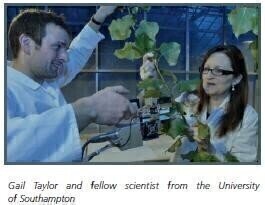News & Views
Southampton Joins Global Race to Develop Biofuels
May 31 2010
Researchers from the University of Southampton have joined a group of other top UK scientists in efforts to develop a sustainable, cost-effective biofuel from algae.
The ‘dream team’ comprising 12 leading UK groups will work with the Carbon Trust to find a winning formula for cultivating 70 billion litres of algae biofuel a year by 2030. This will provide the equivalent of 6% of global road transport diesel and a saving of over 160 million tonnes of CO2 every year. The teams were selected from over 80 initial proposals following an extensive competition and detailed assessment process.
Gail Taylor, Professor of Plant Biology at the University of Southampton, said: “This fantastic opportunity represents an investment of over £1.25m for the University of Southampton to kick-start two projects researching the sustainable fuel of the future.”
Thousands of strains of algae will be screened to find the few that can produce large quantities of a substance similar to vegetable oil. Additional research will develop methods for enabling large-scale production in algae ponds and next year the Carbon Trust plans to start construction of a pilot demonstration plant in an equatorial region where algae are most productive.
Launching Europe’s most significant public initiative into algae biofuels, Tom Delay Chief Executive of the Carbon Trust, said: “We have pulled together a dream team of over 70 UK algae scientists who have the expert knowledge to turn algae into a British biofuel success story. Applying principles this country has developed from its proud agricultural heritage and leading bioscience expertise we will be developing a truly sustainable
biofuel that could provide up to 80% carbon savings compared to diesel savings in car and jet fuel. With a market value of over £15 billion the potential rewards are high.”
Production of 70 billion litres will require man-made algae ponds equivalent to a landmass larger than Wales to be built in optimum locations across the world. Algae need a source of carbon dioxide and water to grow so the Carbon Trust is now looking to investigate possible locations for large-scale plants which could be, for example, next to industrial facilities located near the sea.
The Carbon Trust is investing £8 million over three years into the projects using funding from the Department for Transport (DfT) and the Department for Energy and Climate Change (DECC).
Digital Edition
Lab Asia 31.2 April 2024
April 2024
In This Edition Chromatography Articles - Approaches to troubleshooting an SPE method for the analysis of oligonucleotides (pt i) - High-precision liquid flow processes demand full fluidic c...
View all digital editions
Events
Apr 28 2024 Montreal, Quebec, Canada
May 05 2024 Seville, Spain
InformEx Zone at CPhl North America
May 07 2024 Pennsylvania, PA, USA
May 14 2024 Oklahoma City, OK, USA
May 15 2024 Birmingham, UK


















